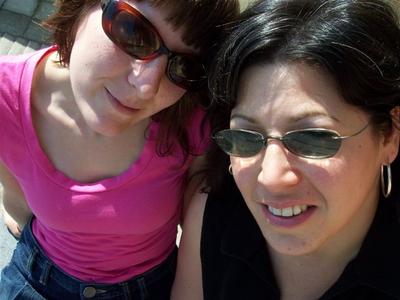By Ken Emerson from this link:
Most grown-ups no longer believe in Santa Claus, but who in his most skeptical, Scrooge-like moment ever suspected that Rudolph the Red-Nosed Reindeer was Jewish and tugged Saint Nick's sleigh left-of-center? Hecky Krasnow -- the record producer who persuaded a drunken Gene Autry to sing the song that became Columbia Records' first million-selling disc -- was a stalwart liberal. Figuring that Rudolph, with a prominent proboscis that was not only stereotypically Semitic but commie-colored, was a victim of discrimination, Mr. Krasnow cheered the underdeer on to victory.
The first head of Columbia Records' children's music department, Mr. Krasnow followed up "Rudolph" with other holiday perennials such as "Peter Cotton Tail," "Frosty the Snowman" and "I Saw Mommy Kissing Santa Claus." In her fond and frequently fascinating memoir, "Rudolph, Frosty, and Captain Kangaroo," Mr. Krasnow's daughter, Judith Gail Krasnow, chronicles the creation of what might be more accurately characterized as holiday novelty songs rather than children's music. Although few such novelties endure -- when was the last time you heard "Santa Claus Wants Some Lovin' "? -- Mr. Krasnow's productions reappear year after year.
Hecky (born Hermann) Krasnow took Irving Berlin one step further (or backward). While the composer of "White Christmas" and "Easter Parade" secularized Christian holidays and made them available to all Americans, Mr. Krasnow (1910-84) made records that commercialized the holidays and emphasized the gifts and goodies they entail. He even persuaded Columbia Records to create a stuffed Rudolph and enlisted his daughters to promote the plush toy in a New York department store.
SPONTANEOUS SINGINGMr. Krasnow was a failed violin virtuoso whose guts were racked throughout his life by Crohn's disease. His first daughter's spontaneous singing inspired him to investigate children's music, to co-author a book about it and, eventually, to collect, compose, publish and primarily produce it for the first wave of the postwar baby boom.Mr. Krasnow believed in equal opportunity, recording everyone and everything from batting tips by Jackie Robinson to prayers by Bishop Fulton J. Sheen. Among his favorite singers were Dinah Shore and Rosemary Clooney, whom he tried unsuccessfully over lunch at the Russian Tea Room to talk out of marrying the philandering José Ferrer.Judith Krasnow's editor should have warned her that reconstructing within quotation marks conversations she did not hear (such as her father's with Clooney) or could not possibly remember verbatim a half-century later defies credibility. She slips up when her father explains to her the meaning of "beatnik" years before the word was coined in 1958. She confuses Tommy Johnston, the composer of "Sonny the Bunny," with Tommy Johnson, the Mississippi Delta bluesman who allegedly sold his soul to the devil. And an on-the-ball copy editor would have corrected howlers such as "coupe" for "coup" and "tambour" for "timbre."
BURL IVES, G-MENYet many of Ms. Krasnow's childhood memories -- the mingled scents of cowhide and cologne in Gene Autry's dressing room, her first encounter with racially segregated toilets in that cradle of U.S. history, Williamsburg, Va., the thuggish disruption of a Paul Robeson concert in Peekskill, N.Y. -- ring vividly true.Arthur Godfrey showed Judith Krasnow how to play the ukulele, and Burl Ives introduced her to the guitar. Her father broke off with Ives, a close friend and one of his most successful artists, when the portly folksinger and actor named names before the House Un-American Activities Committee. In a scene at once haunting and hilarious, Hecky Krasnow and his brother-in-law cram four garbage cans with books and burn the possibly incriminating volumes before the FBI comes calling. A confused Judy and playmates pluck earthworms from their vegetable garden and toss the wrigglers into the flames, giving new meaning to the word "bookworm." (Although Lillian Krasnow, Hecky's wife, thought Joe McCarthy was a "damned stinker," she would beguile the G-men into giving the family a clean bill of health.)
It wasn't Sen. McCarthy but rock 'n' roll that proved Hecky Krasnow's undoing. When toddlers turned teenagers and forsook Tubby the Tuba for Elvis the Pelvis (whose records were banned from the Krasnows' Yonkers, N.Y., home), he threw in the towel and quit Columbia Records. "Rock 'n' roll," Mr. Krasnow protested, "is robbing children of their childhood." He composed songs for Captain Kangaroo, produced early albums by Nina Simone and the Chad Mitchell Trio, and eventually returned to his first love, classical music, playing in the Orlando, Fla., and then Miami symphony orchestras.
Had Hecky Krasnow composed his greatest hits rather than producing them as a staff employee of Columbia Records, he would have died a wealthy man when complications following heart surgery claimed his life in 1984. His records, not their royalties, were his legacy. Now, thanks to a devoted daughter's memoir, his name lives on, too.
Mr. Emerson is the author of "Doo-Dah!: Stephen Foster and the Rise of American Popular Culture" and "Always Magic in the Air: The Bomp and Brilliance of the Brill Building Era."
Subscribe to:
Post Comments (Atom)

No comments:
Post a Comment